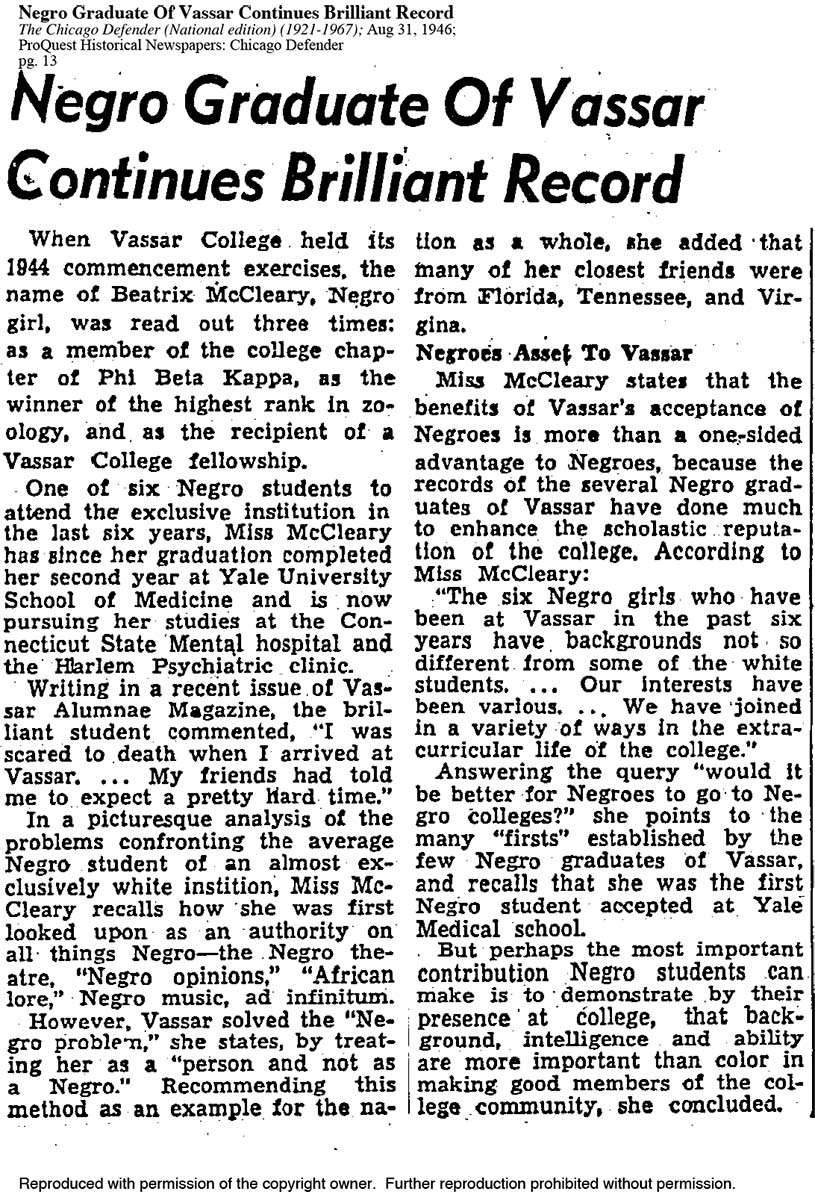This write up describes Beatrix (or Beatrice) McCleary who was previously mentioned as the first known full-time Black student of Vassar. It says she was given many accolades during her commencement. She also became the first Black student accepted to Yale Medical School. She talks about her experience at Vassar, stating that she was at first perceived as the “authority on all things Negro,” but that by the end she was treated as just another student by her peers. She states that Vassar benefits from admitting Black students because all of the Black graduates have gone on to become extremely successful. She continues to detail that institutions should consider that “intelligence and ability are more important than color in making good members of the college community.” It is clear from this article that McCleary holds Vassar in high regard. Vassar, at least according to this article, was doing a better job at welcoming Black students. It shows that alumnae were finding success after graduating.

Full Article
Negro Graduate Of Vassar Continues Brilliant Record
The Chicago Defender (National edition) (1921-1967);
Aug 31, 1946;
ProQuest Historical Newspapers: Chicago Defender
pg. 13
When Vassar College held its 1944 commencement exercises, the name of Beatrix McCleary, Negro girl, was read out three times: as a member of the college chapter of Phi Beta Kappa, as the winner of the highest rank in zoology, and as the recipient of a Vassar College Fellowship.
One of six Negro students to attend the exclusive institution in the last six years, Miss McCleary has since her graduation completed her second year at Yale University School of Medicine and is now pursuing her studies at the Connecticut State Mental hospital and the Harlem Psychiatric clinic.
Writing in a recent issue of Vassar Alumnae magazine, the brilliant student commented, “I was scared to death when I arrived at Vassar. My friends had told me to expect a pretty hard time.”
In a picturesque analysis of the problems confronting the average Negro student of an almost exclusively white institution, Miss McCleary recalls how she was first looked upon as an authority on all things Negro—the Negro theatre, “Negro Opinions,” “African Lore,” Negro music, ad infinitum.
However, Vassar solved the “Negro problem,” she states, by treating her as a “person and not as a Negro.” Recommending this method as an example for the nation as a whole, she added that many of her closest friends were from Florida, Tennessee, and Virginia.
Negroes Asset to Vassar
Miss McCleary states that the benefits of Vassar’s acceptance of Negroes is more than a one-sided advantage to Negroes, because the records of the several Negro graduates of Vassar have done much to enhance the scholastic reputation of the college. According to Miss McCleary:”
“The six Negro girls who have been at Vassar in the past six years have backgrounds not so different from some of the white students. … Our interests have been various. … We have joined in a variety of ways in the extra-curricular life of the college.”
Answering the query “would it be better for Negroes to go to Negro colleges?” she points to the many “firsts” established by the few Negro graduates of Vassar, and recalls that she was the first Negro student accepted at Yale Medical school.
But perhaps the most important contribution Negro students can make is to demonstrate by their presence at college, that background, intelligence and ability are more important than color in making good members of the college community, she concluded.
Negro Graduate Of Vassar Continues Brilliant Record original article (PDF, 40KB)
Reproduced with permission of the copyright owner. Further reproduction prohibited without permission.

